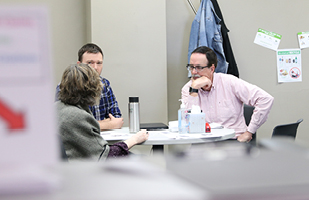Legal Aid Groups Get Social for a Day

Legal aid groups are in greater need of donations this year due to a decrease in funding and surge in civil cases, such as evictions, unemployment, and healthcare, due to the COVID-19 pandemic.

Legal aid groups are in greater need of donations this year due to a decrease in funding and surge in civil cases, such as evictions, unemployment, and healthcare, due to the COVID-19 pandemic.
Year-round, few groups provide as much to at-risk individuals and communities as legal aid organizations.
One day each year, these nonprofit associations work to receive monetary help and manpower to facilitate their missions to help the less fortunate.
This year’s version of Giving Tuesday relied on social media to explain what generosity of time and dollars can do.
“A portion of our revenue is tied to the interest rates [on lawyers’ trust accounts], which plummeted in March and remain at historic lows. Other funding sources are also in question because of the uncertainty surrounding the economy. As a result, individual donations are more important than ever,” said Kate McGarvey, the Ohio State Legal Services Association’s executive director.
In order to increase exposure, these entities make a concentrated effort on social media to provide examples and testimonials of how staff and volunteers have assisted thousands of individuals who’ve felt the housing, financial, and healthcare effects from the coronavirus outbreak.
As is customary on Giving Tuesday – observed each year on the Tuesday following Thanksgiving – the state’s legal aid organizations presented reminders about the importance of their work and ways Ohioans – attorneys and non-legal professionals – can help with civil matters.
For weeks leading up to this year’s day of recognition on Dec. 1, the Legal Aid Society of Columbus and Southeastern Ohio Legal Services (SEOLS) have posted a variety of cases as to how it has supported those dealing with this year’s unusually difficult circumstances.
One case highlighted was a father of two who applied for unemployment after being laid off due to the pandemic. Unable to find another job, he exhausted his savings for weeks as he waited for his benefits. Inevitably, he couldn’t pay for his rent, and the landlord filed an eviction, despite the man’s offer to make payments. After contacting SEOLS, the representing attorney appeared in court on his behalf, and the eviction was stopped by a judge.
“Without (SEOLS), without their help, I don't want to imagine what we'd be going through right now. I really don't,” said the man identified simply as “Jay” to protect his identity.
That demand for financial resources and volunteer assistance for legal aid is especially imperative in 2020 as the COVID-19 crisis has put pressure on millions of Ohioans.
According to a statewide housing and consumer advocacy survey, 49% of those polled experienced decreased wages, 39% said they’d been laid off, and 23% said they faced challenges paying rent or the mortgage due to the coronavirus outbreak.
The pervasiveness of these matters requires institutional infrastructure of how best to address such systemic issues on a case-by-case basis. Given what legal aid organizations have established over decades of work, they’re well-equipped on how to stretch funds to provide present-day solutions that enable benefits beyond a legal resolution.
A 2019 economic community impact study by the Ohio Access to Justice Foundation concluded that for every dollar spent on legal aid, there’s a $2.90 return on investment to Ohioans and communities.
The Legal Aid Society of Cleveland and Akron-based Community Legal Aid Services corroborated those findings as part of a report that found 59% of clients whose cases were resolved between two and five years ago reported a stability improvement.
Money for many is the most direct and simplest way to contribute. Although capital is critical, awareness is also essential to create a bigger pool of donors, especially among lawyers who are always needed for their expertise.
“It’s more than people just giving us donations,” said Melanie Shakarian, the director of development and communications with the Legal Aid Cleveland. “We need attorneys spreading the word about civil justice.”


